Gerald Dawe
Philip Coleman
Described by Terry Eagleton as an ‘impressive first collection’ in which ‘effective emotional reticence and deft feel for rhythmic modulation [...] is alive with unexplicated meaning’ (Eagleton 1979), Gerald Dawe’s debut book of poems, Sheltering Places (1978), marked the arrival of an important new voice in the landscape of Irish poetry. The title poem of that volume signalled an interest in ‘place’, but not in terms of the politics of location that have often troubled Irish poetry, from W.B. Yeats to Patrick Kavanagh and John Montague. Rather than use ideas of place to forge a sense of cultural and political affiliation, ‘Sheltering Places’ describes a retreat into those spaces beyond the bounded and often contested realms of the public sphere. The poem imagines a couple turning ‘the lights out’ and pulling ‘down the blinds’ ‘so that lightning can’t / get in and frazzle us up // in the curtain-dark room’ (Selected Poems 13), but it is precisely within that space of intimate withdrawal that Dawe’s poetic imagination often operates. Reviewing his fifth book-length collection, The Morning Train (1999), the novelist Belinda McKeon wrote in Trinity News that Dawe’s work ‘soars beyond angst and apprehension’ so that the poet can ‘immerse himself fully in the real, the immediate, the worthwhile’ (McKeon 1999). From the very beginning of his career, Dawe has achieved this vision of ‘the real’ by refusing the language and logic of identity politics in his poetry. As he puts it in ‘Names’, also included in his first collection:
They call this ‘the Black North’,
black from the heart out.
It doesn’t matter about
particularities when mouths
mumble the handy sayings
and day-in minds tighten. (Selected Poems 14)
For Dawe, what matters most are the minute ‘particularities’ of experience and history: they serve to challenge and complicate the empty rhetoric spoken ‘when mouths / mumble the handy sayings’. As a poet, critic, teacher and scholar, Dawe has placed this challenge at the centre of all of his creative and academic activities.
Born in Belfast in 1952 and educated at Orangefield Boys School, Dawe has said the world he knew ‘growing up in the upper north side of Belfast city in the post-World War II period of the 1950s and early 1960s was, as far as a young boy could tell, a stable, work-oriented society’ (‘Vestiges’ 215). Furthermore, he has described the environment that formed his earliest experience as ‘liberal, non-sectarian, and undogmatically “unionist” (with a very small u)’ (‘Vestiges’ 216). Later on, and especially during the years of the Troubles in Northern Ireland, Dawe has described the experience of walking ‘almost in a trance, caught between two worlds’: ‘Where I had been part, as a boy and young man, of one reality, by the eighties and early nineties, I now saw another damaged and torn world, and tried to render this contradiction into meaningful poetic terms’ (‘Vestiges’ 228). His poetry’s successful negotiation of these different realities is one of its greatest achievements – he has never been drawn towards partisanship of any kind – but his career has also developed between and among various domains of (Irish) social experience, from Belfast to Galway, initially, and then to Dublin and Dun Laoghaire (County Dublin), where he has lived since 1992. He has also spent extended periods living and working in the United States, where he has served as Burns Visiting Professor at Boston College and also as Charles Heimbold Professor in Irish Studies at Villanova University.
From his boyhood and early education in Northern Ireland – he attended the University of Ulster at Coleraine, where he studied with the novelist and critic Walter Allen (1911-95) – Dawe moved to Galway in 1974, where he wrote an MA dissertation on the work of William Carleton (1794-1869), under the supervision of Lorna Reynolds, at what was then UCG (University College Galway, now the National University of Ireland, Galway). Throughout the 1970s and ’80s he was engaged in a wide range of literary activities and he gained a reputation as one of the most insightful and engaged critics of his generation with frequent and often forthright reviews and essays on contemporary literature in publications such as Threshold, Fortnight, the Irish University Review, Honest Ulsterman and the Linen Hall Review. In 1986 he founded and edited the influential literary and cultural journal Krino with Aodán Mac Póilin, which ran until 1996. Many of Dawe’s essays from this period were collected in The Proper Word: Collected Criticism (2007).
By the time he arrived in Trinity College Dublin to take up a lecturing post in 1988, then, Gerald Dawe was highly regarded in Ireland and further afield not just as an important poet but as a critic of note. In addition to his work as a critic, he has done significant work as an editor and anthologist of modern and contemporary Irish poetry. He co-edited important collections of essays with Edna Longley and John Wilson Foster. He has also edited the Selected Poems of Padraic Fiacc (2012); Heroic Heart: A Charles Donnelly Reader (2012); and he has edited and co-edited writings on and by the Northern Irish poet and playwright Stewart Parker. Earth Voices Whispering: an Anthology of Irish War Poetry 1914-45 (2009) was the culmination of many years of reading and thinking about Irish poetry and the experience of war, and it represents a major contribution to scholarship and the cultural understanding of the role Irish poets have played in the imagination of national and international conflict. Gerald Dawe’s commitment to the place of the writer in the life of the university was affirmed in 1996 when, with Brendan Kennelly, he established the first graduate programme in creative writing to be offered in Ireland, the MPhil in Creative Writing.
Dawe’s own poetry, however, has been the central focus of his intellectual and imaginative energies from the start of his career. Since the publication of Sheltering Places in 1978 he has published seven individual volumes with The Gallery Press, as well as a volume of Selected Poems, which appeared in 2012. Sheltering Places was followed by The Lundys Letter (1985), which contains Dawe’s remarkable poem ‘The Clock on a Wall of Farringdon Gardens, August 1971’ (Selected Poems 22-23). In this poem, which was inspired by the poet’s discovery of ‘a photograph in an Irish current affairs magazine that featured a ten-year retrospective on the Troubles’, Dawe reads the image of the clock ‘like an icon’— ‘a cultural totem’—that represents what he has called ‘a society now at war with itself’ (‘Vestiges’ 225-26). The clock speaks to the reader in the poem, in a manner that recalls the speaking objects of Derek Mahon’s poem ‘Lives’, but Dawe’s focus on the single thing— ‘left here / as if nothing had happened’— allows him to draw the reader right into the world of those who ‘left their lives’ on the day the clock was abandoned on a ‘street razed to the ground in one of the earliest days of intensifying sectarian encounters’ (‘Vestiges’ 225).
‘The Clock on a Wall of Farringdon Gardens, August 1971’ is then an oblique but measured response to the Troubles: ‘part of my task is / not to get panicked’, the clock says, and this also speaks to the way that Dawe’s poems reflect on experience over time. His poems do not articulate immediate or hurried responses to events. Rather, they strive towards a gradual and deeper form of meditativeness that is also reflected by their formal clarity and calm. This attitude of passive engagement—a form of restrained emotional and social involvement that may be traced back to the work of Robert Lowell, one of Dawe’s important US American poetic precursors—is brilliantly summarised in the title poem of his 1995 collection, Heart of Hearts. Here, the reader encounters a man standing on a railway platform but this figure is not sure where he is coming from, never mind where he might be going:
At some distance from directions
arrowed to Bus, Exit, Cross Over By Footbridge,
he will stand apart, muttering to himself,
and in his hands a carrier bag, rolled-up umbrella
like a ton-weight, and he will look intently
at each passerby because he never knows. (Selected Poems 51)
Embodying the Platonic paradox— ‘I know one thing, that I know nothing’—this figure gets to the heart of the matter simply by being present. He is neither here nor there, but in him all of our own contradictions and imperfections are brought into sharp focus. The ‘carrier-bag’ and ‘rolled umbrella’ he carries so heavily (‘like a ton-weight’) are the things by which our lives, as much as his, are given freighted but fragile meaning.
Dawe’s 1991 collection Sunday School contains one of his most well-known poems about the experience of living in Trinity College, which he did for a number of years, commuting back to Galway at weekends. ‘Good Night’ is a vivid evocation of residential life in the College—nearly thirty years after it was written it retains its sharpness of perspective:
The magnolia and cherry trees
flower in the garden below.
In the labs, experiments are timed
to perfection, but the invisible dust
descends on books, paintings,
maps, busts, the executive aquarium,
even the washed dishes on the rack,
and on our faces upturned in the dark. (Dawe 1991)
The image of the ‘executive aquarium’ here echoes the opening of Lowell’s ‘For the Union Dead’, with its description of the ‘Old South Boston Aquarium [...] in a Sahara of snow’ (Lowell 2003). In the same way that Lowell’s poem plays with connections between intimate, personal biography and public history, indeed, Dawe’s poem is at once an autobiographical portrait of his own life during a particular phase and a meditation on the lives of others, from the young woman who lives in the room next door to ‘the police car’s shocking klaxon’ on a distant street. Beyond these, however, the poem also provides a poignant image of human transience and mortality in that closing description of ‘faces upturned in the dark.’
Objects are given their place within the human order of being in this and other poems by Dawe, but they serve as coordinates by which our lives may be measured and understood. It is as if Dawe uses inanimate things, such as the clock in ‘The Clock on a Wall of Farringdon Gardens, August 1971’ or the ‘books, paintings, / maps, busts’ of ‘Good Night’, to tap into what he has called a certain kind of ‘psychic energy’ that he has posited as one of the driving forces of his poetry (‘Vestiges’ 230). This is no mystical thing, however, but it is related to his profound engagement with the meanings of human connection, both in terms of the ways that we might relate to strangers – such as the neighbour in ‘Good Night’ or the man on the platform in ‘Heart of Hearts’ – or our closest family members, friends and colleagues. As he writes in ‘Human Wishes’:
Our selves dissolve into side streets;
arm-in-arm, ever so slightly, we go
past the buggy that’s been left behind,
the supermarket trolley, the beer kegs [...] (Selected Poems 70)
As Dawe surveys the world of things here, the self of the poet is bound up with other selves among whom (‘arm-in-arm’) his own identity is constantly forming and re-forming. Central among these other selves for Dawe have been members of his family—including the dedicatees of his Selected Poems, his wife Dorothea, his daughter Olwen and his son Iarla—but one can also trace throughout his work a line of engagement with fellow poets and teachers in Trinity College Dublin as well as other scholars and artists. In poems such as ‘The Just’ (for John Wilson Foster), ‘The Water Table’ (for Tom and Julie Kilroy), ‘Summer Journal’ (for Brendan Kennelly), ‘Distraction’ (for Nicholas Grene), ‘Points West’ (for Kevin Smith and Eve Patten), ‘Fifty/Fifty’ (for Gerard Fanning) and ‘The Pleasure Boats’ (for Terence Brown), he gives voice to a career spent in close and active dialogue with notable critical and cultural commentators of the late twentieth and early twenty-first century in Ireland. Out of these conversations, however, Dawe’s own voice emerges clear and resonant, offering original and compelling perspectives on what it means to ‘register the past in the presence of everyday things, the material and visible world, the settings of recollected landscapes’ (‘Vestiges’ 220).
In Mickey Finn’s Air (2014) Dawe expands this project. The volume appears slight – at less than fifty pages it may be his shortest collection to date – but the opening poem, in particular, reinforces the expansive sense of personal and public history that has always provided a crucial dialectic of engagement for his work. Foregrounding the theme of memory from the outset, ‘Déjà vu’ begins with a series of observations that bring the poet’s sense of the present into immediate contrast with images remembered from the past, but in the course of the poem Dawe arrives, finally, at a vision of the recurrent newness of things:
the light on a landing, a door that was never
quite flush, the names cut one summer
in the softened flashing of the top window,
and all the things that seem the same,
moonlight on rooftop, the shouted question,
a slow silhouetted figure that moves
across blinds, the brazen air of spring
as everything becomes new once more. (Mickey Finn’s Air 14)
It is this visionary openness to the possibilities for renewal in situations of apparent personal social, political, and cultural inertia, upheaval and loss that is one of the abiding hallmarks of Gerald Dawe’s poetry. Mickey Finn’s Air gives clear voice to a vision that is equally concerned with ethics and aesthetics, as Nicholas Allen has suggested of Dawe’s work in general (Allen 2007).
Readers and scholars of Gerald Dawe’s poetry are fortunate in having a rich and detailed mine of critical and autobiographical material at their disposal, both in the form of recollections and perspectives on his experience provided in books such as Conversations: Poets & Poetry (2011) and The Stoic Man (2015), and in the poet’s archive held in the Burns Library of Boston College. Dawe’s poems often reflect in a self-conscious way on the nature and function of his art, however, and in his poem ‘Autobiography’ he offers his own take on the questions of what poetry is for, how it relates to the past, and our experience of the present as a perpetually unfolding moment:
High winds break our shelter-belt of trees.
The world becomes stranger. Are you, am I,
treading upon some loose and complicated path
of dead and living, figures etched in the night?
I fetch the torch and its naked beam strafes
the periphery wall to find you startled with light. (Selected Poems 50)
The imagery of this poem is close to the world conjured in ‘Sheltering Places’, and here too the poet describes an experience that is born out of an anxious meditation on the turmoil of the external world as it bears in on the lives of individual selves. In a way, this is a metaphor for the enterprise of lyric poetry itself, as Dawe sees it. The lyric poet, for him, shines a light on the ‘complicated path’ we must all travel as we make our way in the world. This gesture is epic in scope – it is evocative of Dante’s ‘mezzo del camin de nostro vita’ – but it also expresses a commitment to the art of compression that is the central aesthetic task of the lyric poet. The ‘you’ and the ‘I’ of ‘Autobiography’ are parts of Dawe’s own poetic subjectivity, but they are also the poet and his reader. In a world that continually ‘becomes stranger’, Dawe’s work as poet, critic, and teacher still recognises but also complicates ‘the properties [...] of “making do” and subsequently of “getting on”’ that were so much a part of the world he grew up in (‘Vestiges’ 216). From his earliest work to his most recent, Dawe has stayed true to this project, using poetry as a ‘torch’ to light up both his own personal experience and the lives of those around him.
Cite as: 'Gerald Dawe' by Philip Colman at https://www.tcd.ie/trinitywriters. First published January 2016.
Works Cited
- Allen, Nicholas (ed.). The Proper Word: Collected Criticism – Ireland, Poetry,Politics. Omaha, NE: Creighton University Press, 2007.
- Dawe, Gerald. Sunday School. Oldcastle, Co. Meath: The Gallery Press, 1991.
------. Selected Poems. Oldcastle, Co. Meath: The Gallery Press, 2012.
------. 'Vestiges: Poems as Afterlives, A Reading'. In Memory Ireland, vol. 3: The Famine and the Troubles, ed. Oona Frawley. Syracuse: Syracuse University Press, 2014: 215-31.
- Eagleton, Terry. Rev. of Gerald Dawe, Sheltering Places. Stand 29.3 (1979).
- Lowell, Robert. 'For the Union Dead.' Collected Poems, ed. Frank Bidart and David Gewanter. New York: Farrar, Straus and Giroux (2003): 376-78.
- McKeon, Belinda. Rev. of The Morning Train, Trinity News [1999]. qtd. on http://www.gerald-dawe.net/#!poetry/ca24. Accessed 8 Feb. 2014.
- Mahon, Derek. 'Lives.' New Collected Poems. Oldcastle, Co. Meath: The Gallery Press, 2011: 45-46.
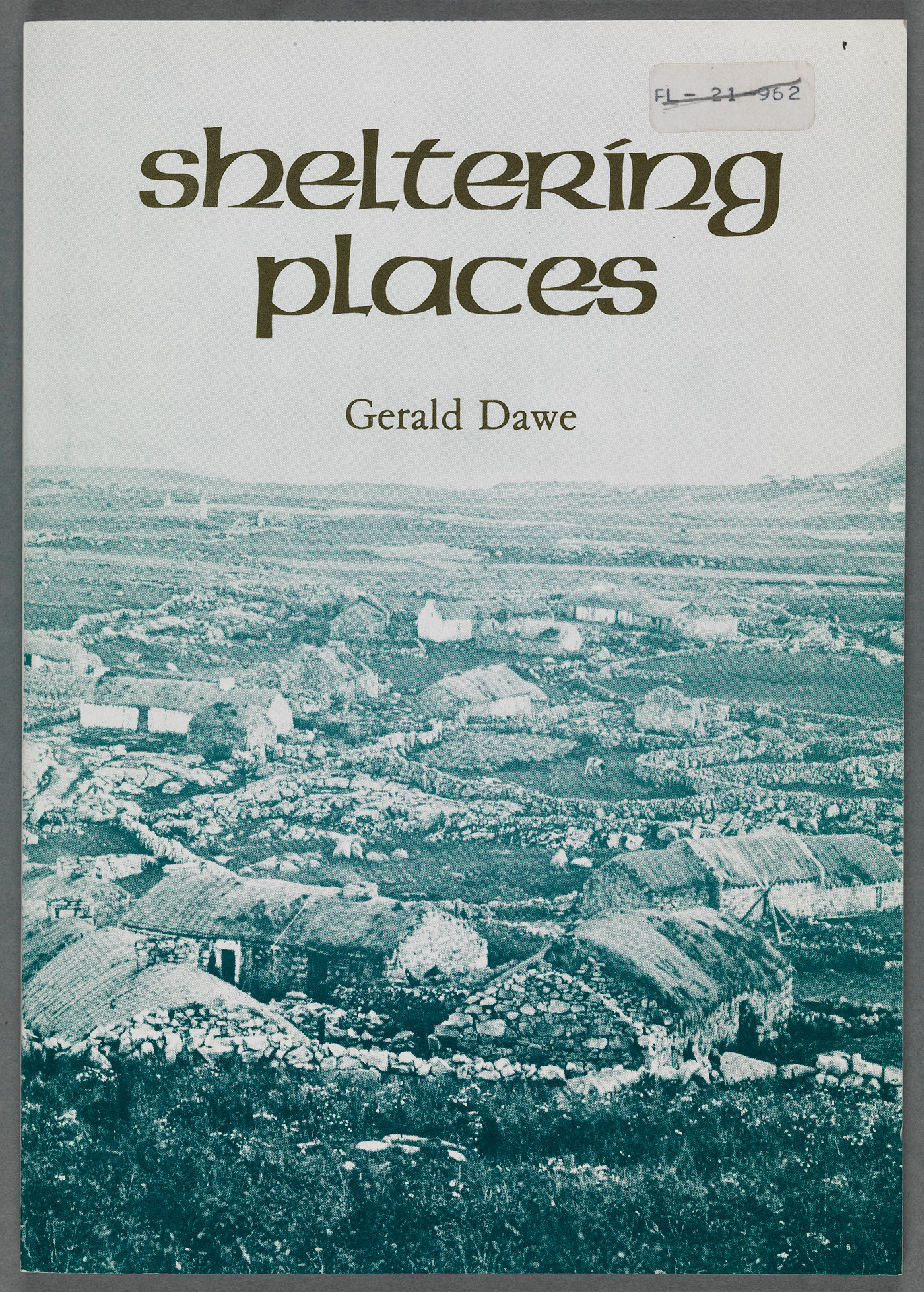
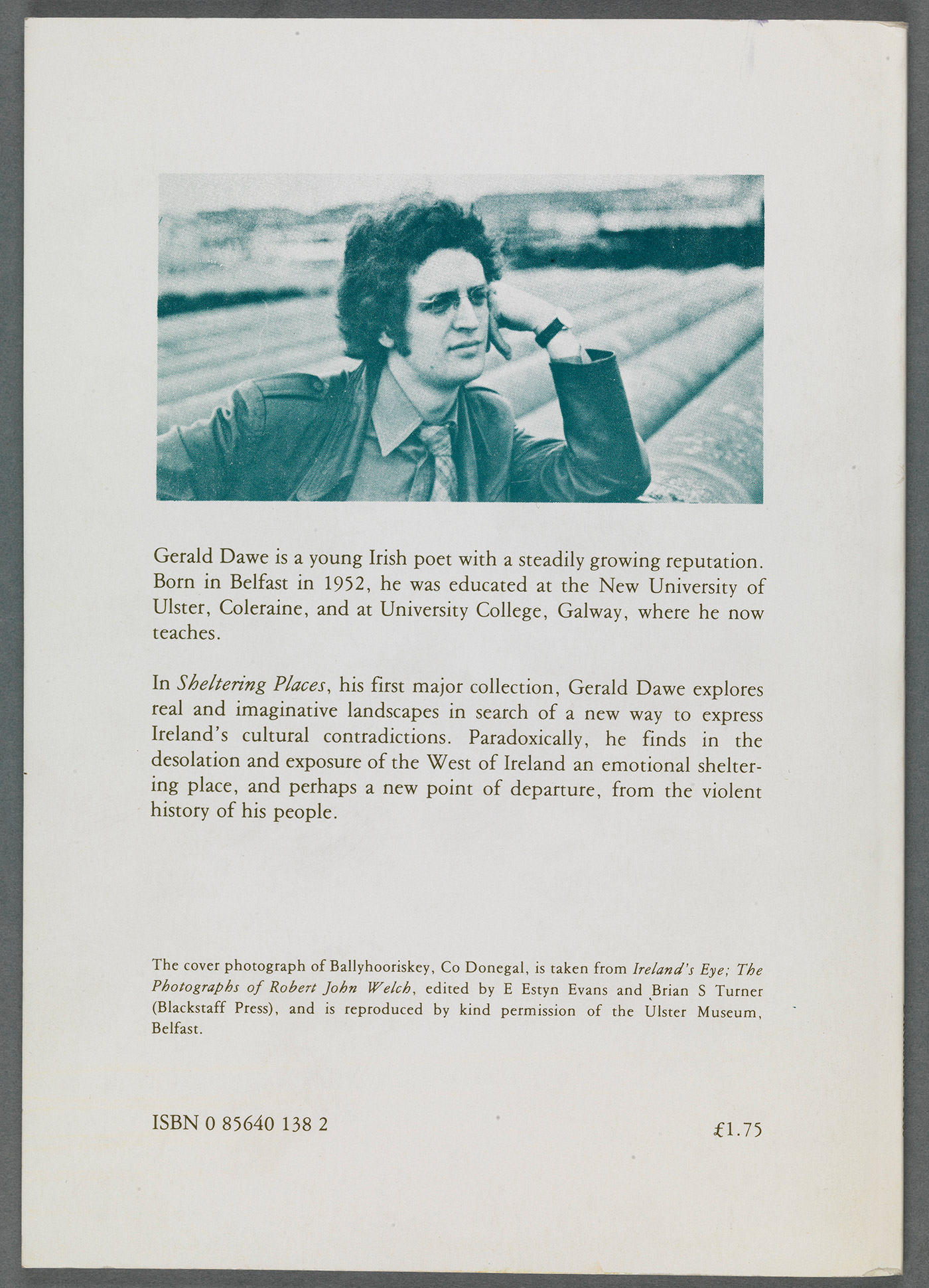 Gerald Dawe, Sheltering Places (1978) by permission of the Board of Trinity College
Gerald Dawe, Sheltering Places (1978) by permission of the Board of Trinity College
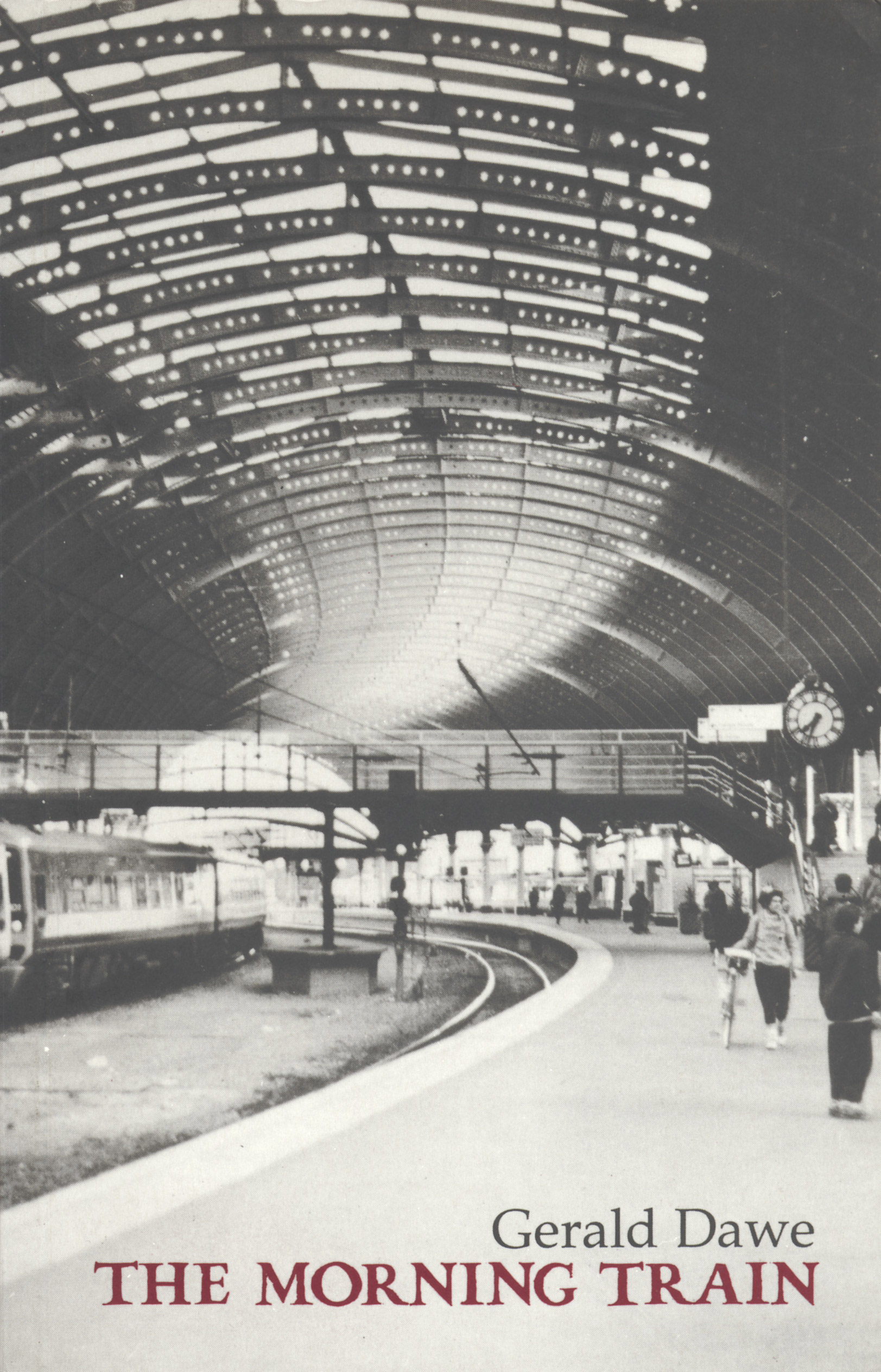 Gerald Dawe, The Morning Train (1999). Image courtesy of The Gallery Press
Gerald Dawe, The Morning Train (1999). Image courtesy of The Gallery Press
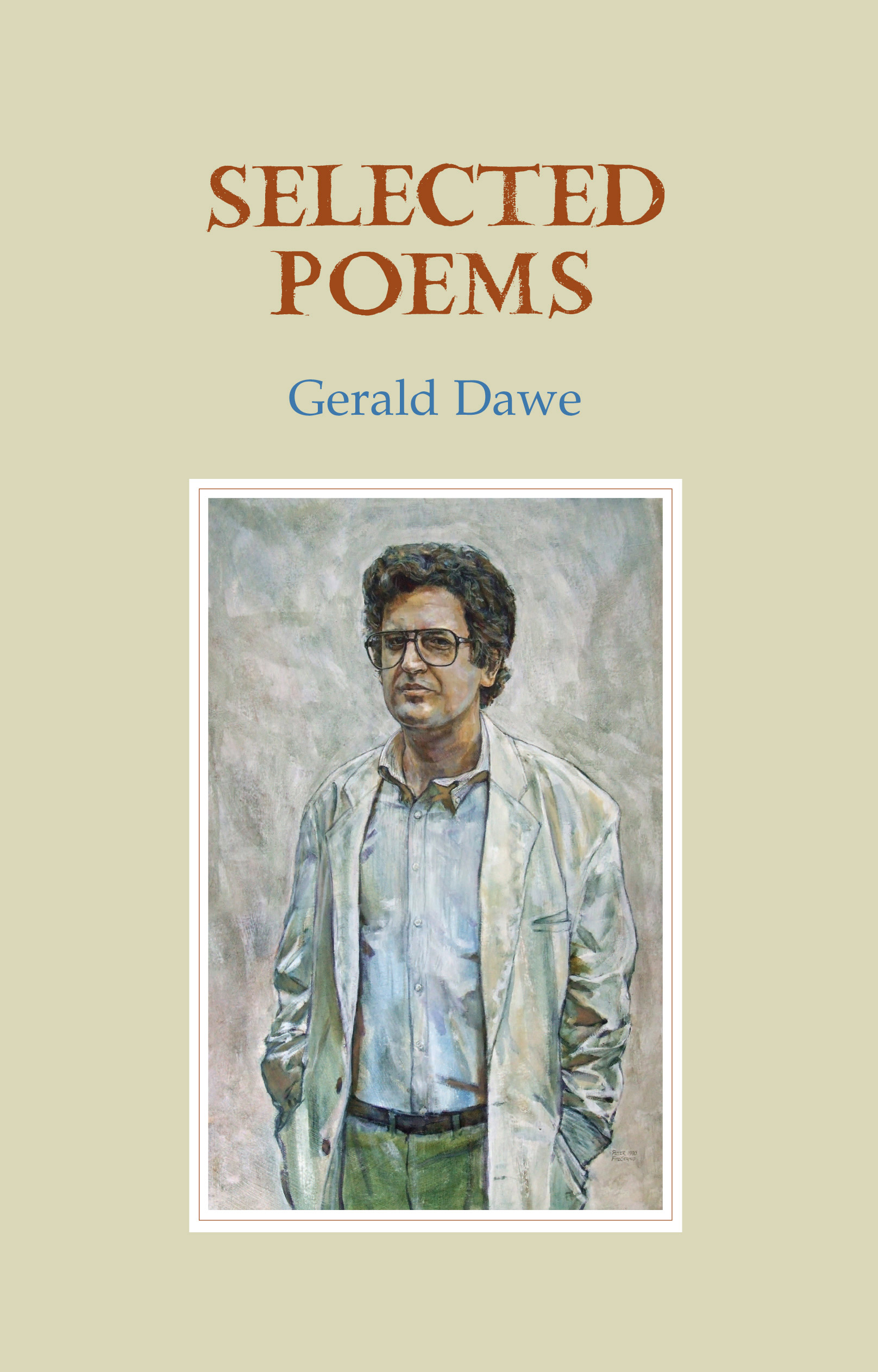 Gerald Dawe, Selected Poems (2012). Image courtesy of The Gallery Press
Gerald Dawe, Selected Poems (2012). Image courtesy of The Gallery Press
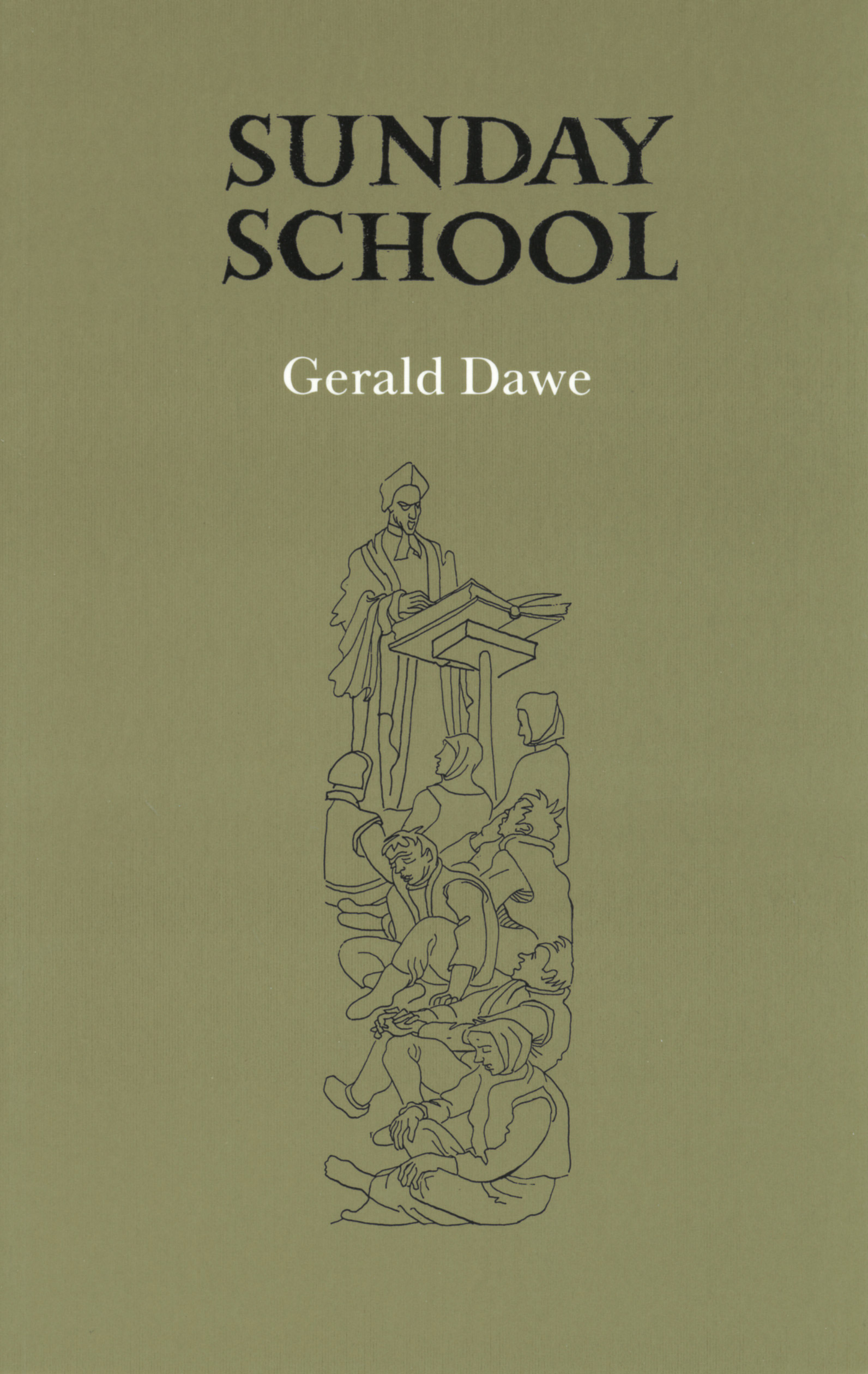 Gerald Dawe, Sunday School (1991). Image courtesy of The Gallery Press
Gerald Dawe, Sunday School (1991). Image courtesy of The Gallery Press
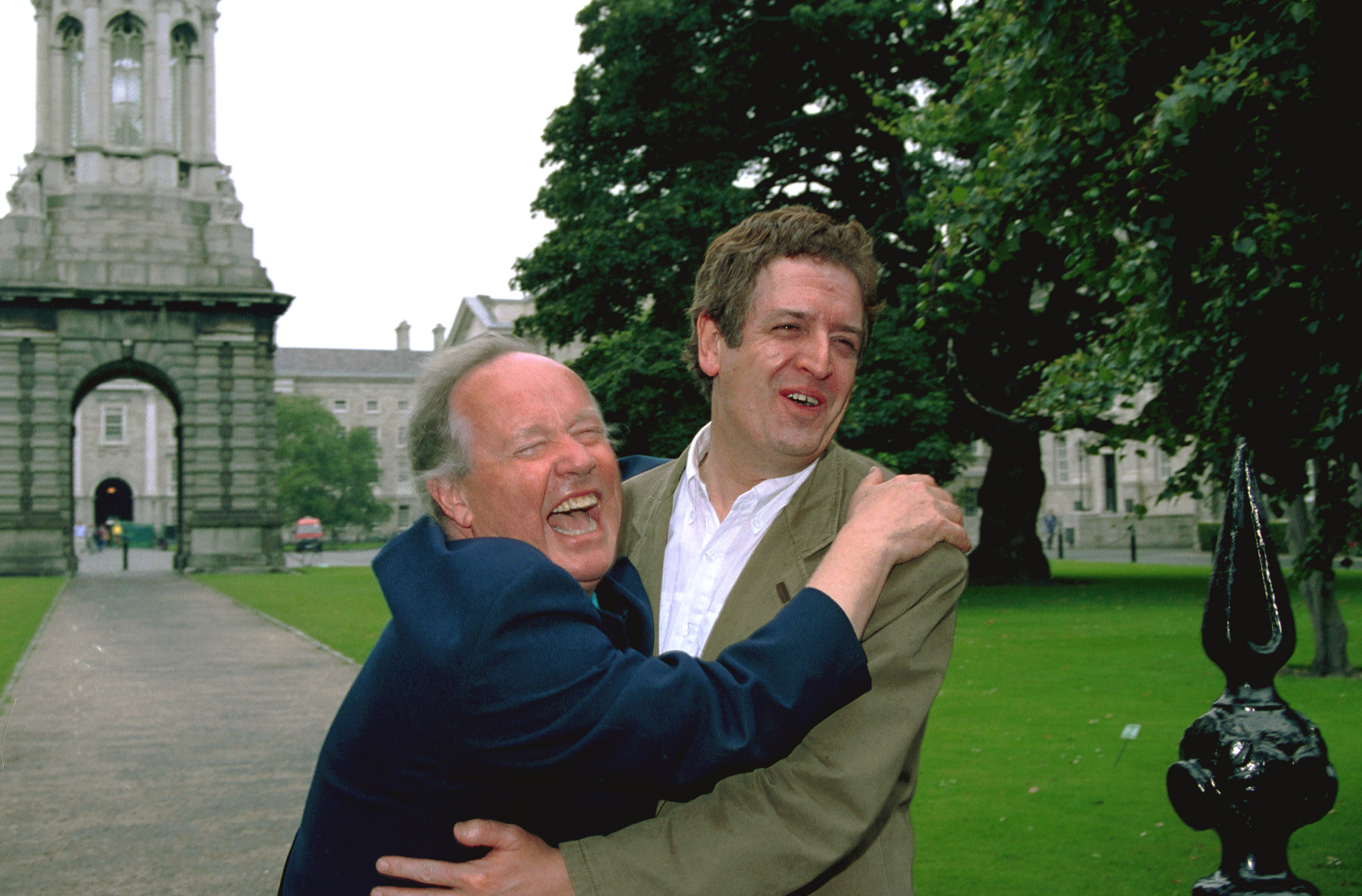 Brendan Kennelly and Gerald Dawe photographed in Front Square, TCD
Brendan Kennelly and Gerald Dawe photographed in Front Square, TCD
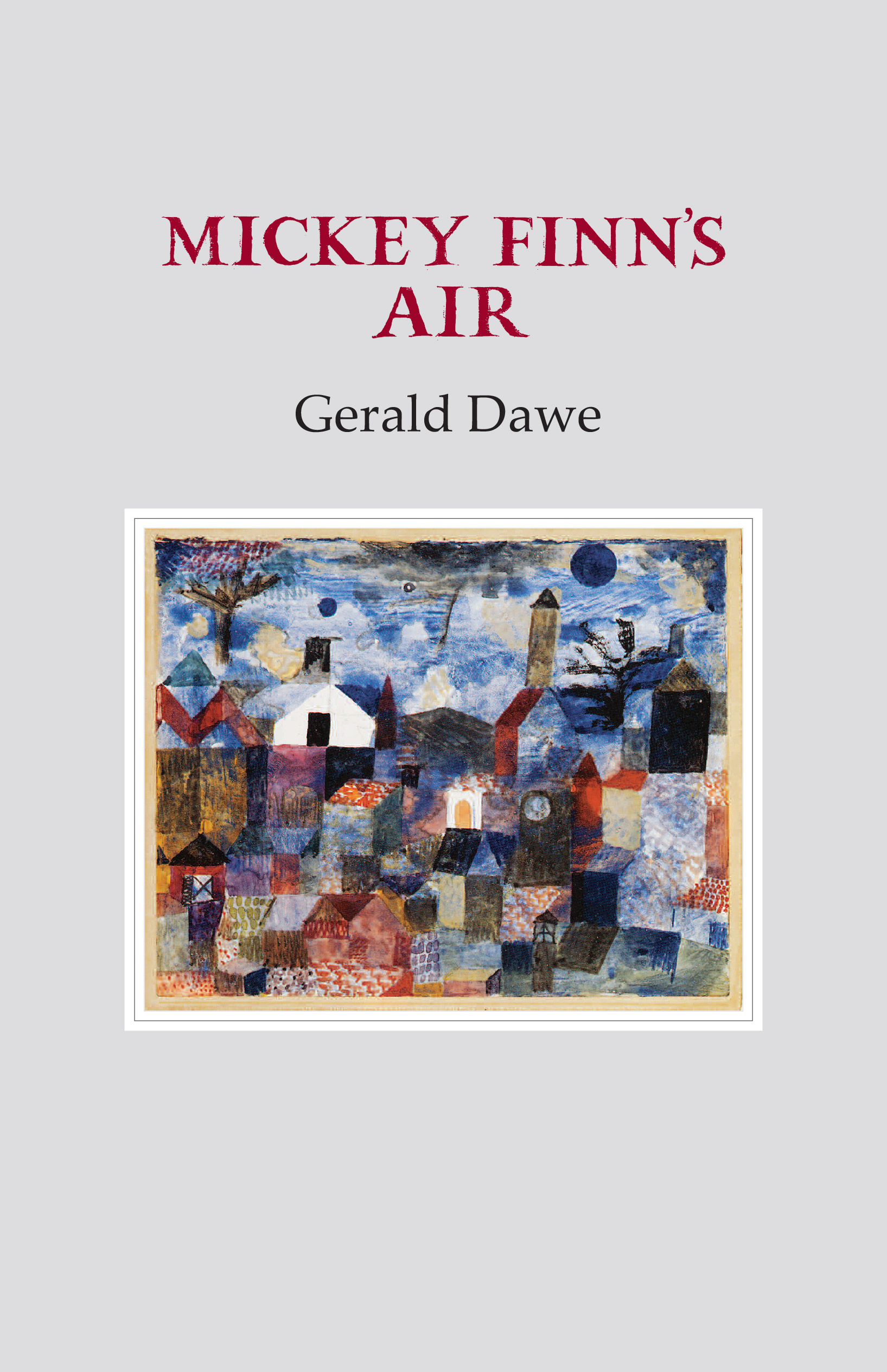 Gerald Dawe, Mickey Finn’s Air (2014). Image courtesy of Gallery Press
Gerald Dawe, Mickey Finn’s Air (2014). Image courtesy of Gallery Press
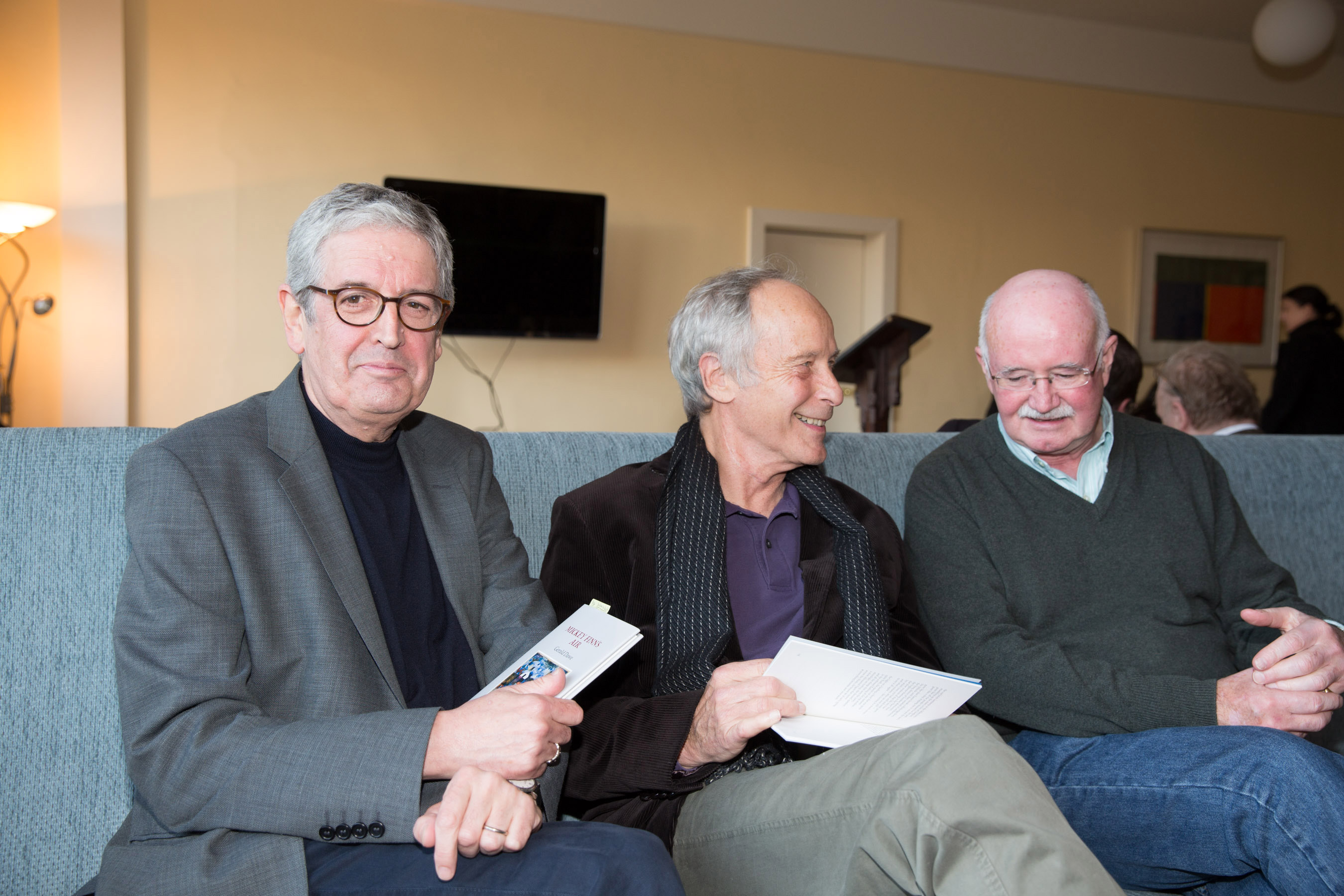 (from left to right), Gerald Dawe, the novelist Richard Ford, and the publisher of Gallery Books, Peter Fallon, at the launch of Mickey Finn’s Air.
(from left to right), Gerald Dawe, the novelist Richard Ford, and the publisher of Gallery Books, Peter Fallon, at the launch of Mickey Finn’s Air.


